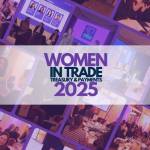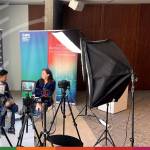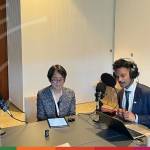Women in Trade 2020
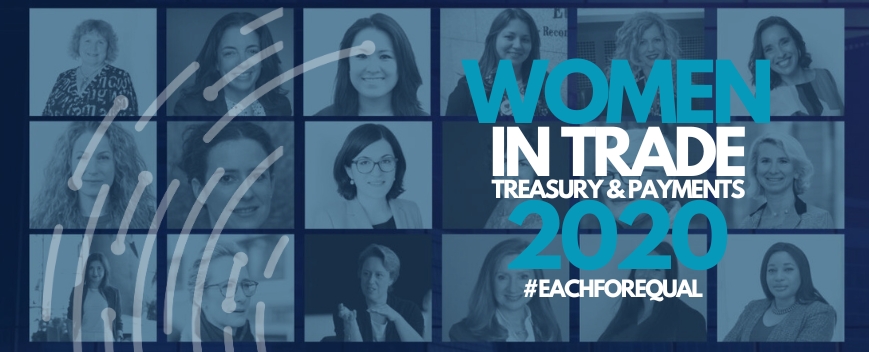
Content
Women in Trade – Celebrating International Women’s Day 2020
Today marks International Women’s Day, a global day focusing on equality – #EachforEqual – calling on us all of us to challenge stereotypes, fight bias, broaden perceptions, improve situations and celebrate the achievements for women’s achievements.
This year’s theme is ‘Each for Equal’. TFG celebrates the economic, cultural, political and social achievements for women, because an equal world is an enabled world.
The conversation about gender equality at work needs to continue, and Trade Finance Global continues to discuss the lack of progress achieved across the trade and financial services sector and looks to ensuring improvements continue to be made across the board.
We spoke to 18 female role models within the trade space, asking for their stories, advice and challenges on the way to becoming the inspirational leaders that they are today.
Souleïma Baddi, CEO, komgo
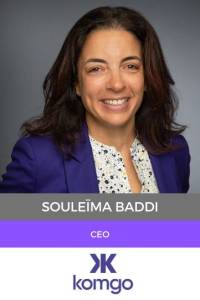
What specific tasks and responsibilities does your job require? What things do you like most about your job?
Becoming a CEO is one of the most amazing professional experiences. As the highest-ranking individual in the company, I am responsible for the overall success of the business and for making top-level managerial decisions, leading the development and execution of long-term strategies, with the goal of increasing shareholder value. In a smaller company such as komgo, the CEO also takes on a more “hands-on role”, such as making lower-level business decisions (e.g., hiring of staff).
In other words, 50% of my time is dedicated to managing our 17 shareholders, 50% is dedicated to clients, communication, maintaining awareness of the competitive market landscape, expansion opportunities, industry developments, 50% is dedicated to the team and 50% to setting strategic goals and making sure they are measurable and describable, assessing the risks of the company and ensuring they are monitored and minimized.
On International Women’s Day, what is the most important message you want to send out to young women thinking about their careers?
My advice to women in the workplace would be to work hard and know your stuff. The more you know, the more powerful you are. Always be thorough. Don’t just sit at the table; talk at the table! Make it a point to contribute at least once in every meeting you attend. If you’re at a total loss for what you might contribute, make it a point to ask at least one question. Establish a group of mentors to whom you can turn to bounce an idea around or check in about a possible career move. Remember that even a mentor relationship is two-way and you should bring something to it. Always think and be clear on what is key for you and what you agree to compromise on. Last but not least, be patient and never give up!
In TFG’s exclusive podcast with komgo, we heard from CEO Souleïma Baddi talking about bringing blockchain and distributed ledger technology to commodity finance.
Marilyn Blattner-Hoyle, Head of Trade Finance, AIG
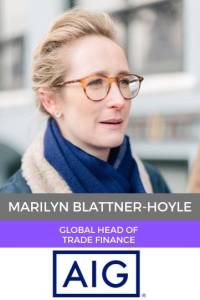
In your opinion, why is it important that more women take up trade as a career in the near future?
It is incredibly important and something I spend a lot of my time on – mentoring women in my team, but also in the industry to inspire the next generation of female trade finance leaders. The trade finance industry is known for being male-dominated and the number of times I walk into an all-male room or watch an all-male panel does amaze me – how it is statistically possible? But positively, I can say, diversity in trade is here. My trade finance team at AIG is already highly diverse. I have always seen diversity as a critical part of building our trade finance team.
Trade finance is all about goods and services being exchanged across borders with a wide variety of participants. We have to have a team that reflects today’s globalized trade world and supports diverse points of view and styles to generate better solutions and a strong team culture, which ultimately empowers us to best serve and understand our clients.
What’s the most important piece of advice you’d give to a woman thinking of starting a career in trade finance?
It would have to be focus on execution and your elevator pitch. I was once asked by one of our employee resource groups to give a presentation on my journey as a female leader and advice I would give. So I did an interactive session called “Strategic Execution Planning”. The session ranged from tackling scenario and outcome analysis, meeting and momentum driving, stakeholder management with relationship maps (who’s who to get things done), the power of the informal (what is your golf?) and finally my favourite, elevator pitches. Always have your 30 second intro about yourself, your project, your plan as you never know when your 5 minute slot will be cut or you’ll run into the CEO in the elevator –this happened to me as a junior lawyer and he asked me “What do you do for Hogan Lovells?” and there I realised that I better get a new short elevator pitch. In fact being able to get any point across in 30 seconds is a great skill and key to advancement. Admittedly this wasn’t the expected topic, but it ended up resonating widely with the women (and men) in the group. Thinking about these strategies to secure execution of any goal and get your point across quickly allows one to foresee hurdles and interestingly also tackle gender differences. And in the end, successful execution of tasks, deals, negotiations, relationships and your points is what builds a great career.
We discussed with Marilyn some of the challenges and opportunities in the trade credit insurance sector. Enabling the much-needed reduction of the trade finance gap, and bringing in a wider array of investors while mitigating the risks of such expansion in the backdrop of geopolitical uncertainty will be a huge challenge in 2020.
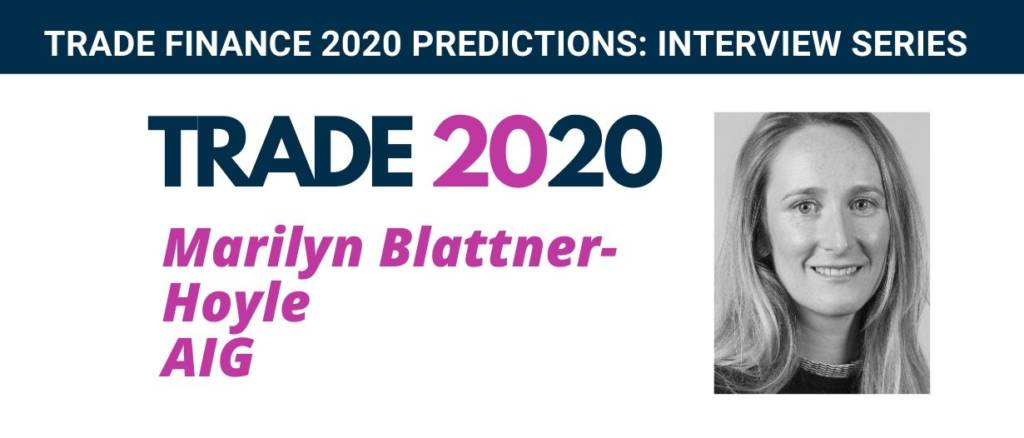
Ana Boata, Head of Macroeconomic Research, Euler Hermes
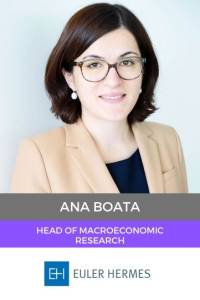
Why did you choose a career in this sector?
The job of macro economist has immediately seduced me given its complexity and dynamism. Since I have started working back in 2010 there has not been a single year without a new risk to assess. As macro economists we have the luxury to come every day at work and think, innovate and write !
In your opinion, why is it important that more women take up trade as a career in the near future?
I firmly believe more diversity, and particularly gender diversity is a plus to the industry as several reports show that diverse mind sets and ways of thinking bring higher value added to companies and make them more profitable and innovative.
Is now an exciting time to be in trade finance? Why?
Trade has always been a passionate field to work in, but recent years have increased its complexity. The record high uncertainty we are living in, be it from the protectionism, the political risks or the Coronavirus outbreak perspectives make the job even more challenging and therefore interesting ! Getting to live these times and understand where global trade is heading and what are the economic consequences for companies but also people is a great opportunity for everyone working in trade finance nowadays!
Do you find that there is a gender gap at the top in trade?
As long as companies would not have build enough their pool of next leaders women the gender gaps at the top will remain. And it’s a normal process to go through after several years of little action! What is important is that we keep working on this, all together, men and women! #EachForEqual #StrongerTogether
On International Women’s Day, what is the most important message you want to send out to young women thinking about their careers?
Keep your values and believe in your strengths while improving your weaknesses ! If you project is clear and you make full usage of your means you will certainly succeed! #BelieveInYou
Trade Finance Global caught up with Ana Boata at Euler Hermes at The Institute of Export & International Trade’s World Trade Summit. A very interesting macroeconomic view on how households, retail and economic growth has changed in 2019 due to trade wars, Brexit and business uncertainty.
Silja Callac, ITFA
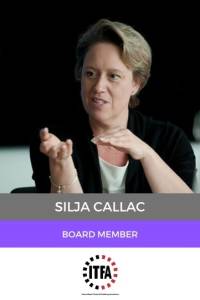
Why did you choose a career in this sector?
By chance: I actually wanted to become a derivative trader, but the training experience in Forfaiting paid off better – and once part of the secondary market, you don’t want to do anything else anymore
Have you encountered any related challenges in your career along the way to becoming who you are today?
Oh sure I have – I guess anyone who wants to progress and is successful encounters envy, competition and tough decisions. And maybe as a woman, the hurdles might be a bit higher – or at least they were 15 years ago.
It was often not easy to get access to a male network, sometimes I was being told that I’m a bad mum, leaving my kids alone just to pursue my interests and once I was told at an event that I was only “a quota woman” – referring to female quotas we have in Germany in some companies. I think in such situations best is just to smile and carry on. Such comments are just not worth to be taken seriously.
What specific tasks and responsibilities does your job require? What things do you like most about your job?
Good social skills, networking, quick understanding of structures and lots of enthusiasm.
I like the product – I really think trade finance is important to help development in the world. I also like that my job is never boring – there are so many different underlying transactions with even more possible solutions. It’s exciting to always find the perfect structure to a situation. And last but not least I like that this job is so international – you meet people from all over the world, learn about other customs and cultures, this is very enriching.
I think trade finance is always exciting to be in – but presently with all the changes due to digitization on the one hand side and with the challenges due to a polarisation between nationalism and globalism it is really important to have capable new talents who help us re-think our way of doing business.
In your opinion, why is it important that more women take up trade as a career in the near future?
I think women might have another way of approaching topics. Sometimes they do get more to the point, do not get so easily side-tracked. They are also often more attentive to what others need, able to accept compromise. In trade finance cooperation is essential and female strengths can help and be complementary. Also, the trade finance secondary market is like a big family – people matter, so this is an environment where women will feel quickly comfortable.
But I think it’s diversity in general which is important: we need juniors and seniors listening and inspiring each other, we need people from different countries and cultures teaching each other.
Do you find that there is a gender gap at the top in trade?
Yes, definitely there is a gender gap in senior management of transaction banking – it’s more significant in some countries than in others though.
How do we attract more women into careers within the trade/trade finance industry, that has traditionally been dominated by men?
Giving them a good network, educating about how exciting the job is: that’s exactly what ITFA’s Emerging Leaders are doing: through mentoring programs and presentations at universities, we try to show also to young women how great a career in Trade Finance can be. Also it’s very important to offer flexible working arrangements to women: we like and sometimes need to be able to work from home or work flexible hours.
What’s the most important piece of advice you’d give to a woman thinking of starting a career in trade finance?
Don’t underestimate yourself, don’t sell yourself below your value – dare to voice your expectations. We women often wait to be offered a good opportunity. In interviews we tend to tell rather what we do not know to do instead of underlying our qualities. I fought myself hard to get a bonus or an increase for my team – but did not dare to ask for a rise in my own salary…
On International Women’s Day, what is the most important message you want to send out to young women thinking about their careers?
Although trade has some techniques, which exist for centuries it is a very vibrant, exciting and quickly developing business. There are so many different activities, you’ll for sure find the perfect place to evolve and never get bored. If you do not know where to start – come to ITFA, in our Board we have as many women as men and all of us (including the men!) will be delighted to help you get connected and find the right spot for you in our “big family”.
What is the ITFA Unfunded Master Risk Participation Agreement (MRPA), how does it differ to the BAFT Funded MRPA and who uses it?
Alisa DiCaprio,R3
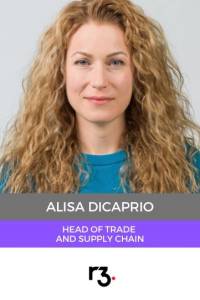
Why did you choose a career in this sector?
I chose this career to push the boundaries of technological solutions to intractable problems in trade finance.
In my previous position at Asian Development Bank (ADB), I spent four years calculating and socializing the global trade finance gap. While banks, fintechs and governments all recognized the need to narrow it, nothing substantially moved the needle year after year.
Blockchain was the first technology that had a fundamentally new approach that didn’t share the shortfalls of other digital trade finance solutions. And R3 was a company that was doing interesting, credible work in this space.
I wanted to bring the viewpoint I had of working with corporates in developing countries to a technology that promised to change how trade is done.
Is now an exciting time to be in trade finance? Why?
The sector is undergoing a period of unprecedented change. It is slowly but surely moving from being one of the most paper-based, to embracing the benefits technology brings. To support this change, trade finance needs innovative people with a knowledge of both trade and technology. There is an appetite for fresh ideas in the sector.
This means that there is scope for the to be defined by the period of change trade finance is undergoing, making them more open ended. Subsequently, there is a focus on recruiting new talent into the trade finance network, to cater to the increasing presence of technology in sector.
Additionally, many of the infrastructure shortfalls that have limited the expansion of affordable trade finance (like legal requirements for paper documents) are being reconsidered and redrafted. Now, we can say that blockchain finally caused us to take a second look.
On International Women’s Day, what is the most important message you want to send out to young women thinking about their careers?
My advice would be to be aware of the support networks that are available to you. There are more opportunities out there than ever before and the door is open for young women to explore opportunities in any sector they want.
This is especially true in financial technology and blockchain, where there are more networks than ever available to foster female talent. For example, Trade Experettes, Association of Women in International Trade, Women in FinTech, Women in Blockchain and more.
In this edition of Trade Finance Talks, we’re going to be hearing from Alisa DiCaprio, Head of Trade and Supply Chain at R3 on Corda, blockchain and data exchange in trade
Susana Ecclestone, British Argentine Chamber of Commerce
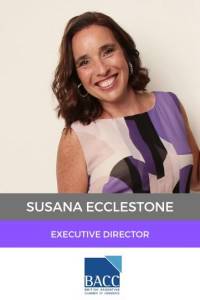
Why did you choose a career in this sector and have you encountered any related challenges in your career along the way to becoming who you are today?
Life has taken me in many different directions and sectors having had to reinvent myself as a professional every time. Being a foreigner always has its challenges but it also brings up opportunities to capitalize on what you have learnt along the way and how to apply it to your business life.
In my case, coming from South America originally has allowed me to have a different perspective to things and deal with challenges more easily. Nothing is easy in Argentina and you always have to be creative in a very competitive environment. Once you leave your comfort zone and you move to another country, as a woman and a professional, you need to make a difference to be noticed. Language and cultural differences are highlighted in some business scenarios in both a positive and negative way and this is where you need to adapt and get to understand the way business is done from a cultural perspective.
What does the International Women’s Day slogan, #EachforEqual mean for you in your work life?
Being a woman in this role has a lot of advantages, which I enjoy daily. I get to meet amazing individuals and fascinating projects, you get to learn about new technologies, business models, creative products and ideas. I do not consider myself a feminist because I do not think we have to prove ourselves more than just by being the professionals we are. I work with groups of women dedicated to different sectors who are extremely focused and successful, highlighting the talent they have amongst their ranks. Some of these women work in men led environments but they stick out regardless because they are extremely smart and remarkable at what they do.
Talent has no sex. It depends on how it is driven, directed and focused.
Women are more resourceful and find dealing with multiple challenges more second nature. I think we are designed to multitask. In trade, this adds value as much as being creative and forward thinkers. Trade is not about putting out fires while your merchandise reaches a destination, it is about how you make sure the fires never happen or are less frequent, who your partners are in the country you are exporting to and how you communicate regularly with them. I always recommend exporters to visit often, mix with the locals and get to understand the challenges first hand. It is important to have a comprehensive understanding of a market, not only the business aspect of it. You cannot be an exporter by email.
Business women my age have lots of advantages: we have been down the road, we have hit walls and got stuck. We have had the blocker boss or the one who lets us go ahead with your crazy idea. We know when to recalculate, turn around and admit something is not going to work. I think we are living in an age when age does not matter and you can reinvent yourself, change careers and find your passion at any time. Successful women deliver, they do not spend time questioning themselves whether they are being valued. Age and experience are underestimated nowadays and having senior staff in your business can add a lot of value to your business. Smart businesses are talent led.
TFG spoke to British Argentine Chamber of Commerce’s, Susana Ecclestone about Argentina’s trade opportunities.
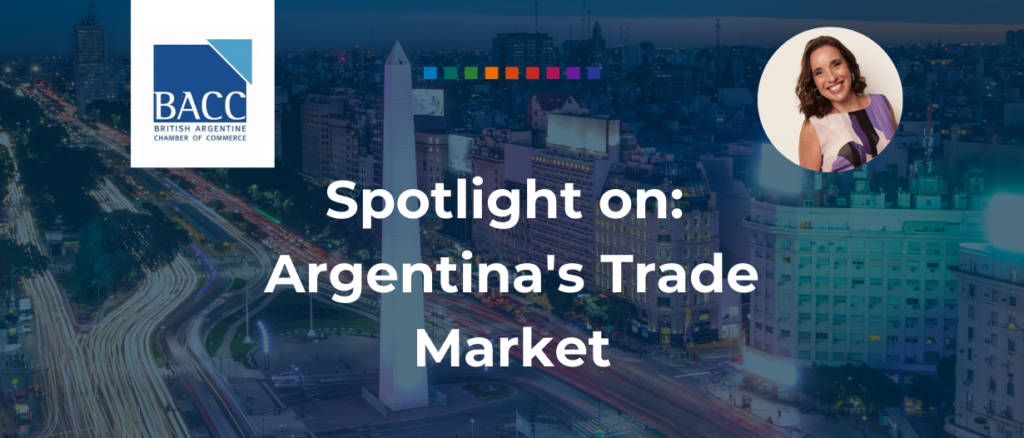
Stacey Facter, SVP, Trade Products, BAFT
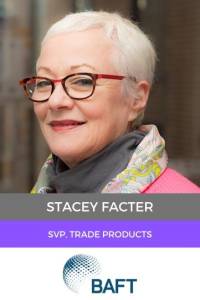
Why did you choose a career in this sector?
Besides always being fascinated by different cultures, people and languages, I learned early on in my career that international trade would provide me a stable profession. While pursuing my MBA, I attended a career event in which an international banker inspired me to pursue a banking career. Self- sufficiency and financial stability were important drivers for me. No matter the strength or weakness of the dollar, financing imports and/or exports offers the opportunity for a strong lasting career.
Have you encountered any related challenges in your career along the way to becoming who you are today?
I did not always understand how I was coming across to others in the workplace. No matter how smart you are or how well you understand your job, as an employee, colleague or manager, remember to find the best means to communicate. This means adapting and adopting a style that does not necessarily come to you naturally. Since communication and teamwork are crucial in the workplace, and how you communicate is of supreme importance, whether relating to your superiors, peers or employees, remind yourself to listen and respond clearly and respectfully.
What’s the most important piece of advice you’d give to a woman thinking of starting a career in trade finance?
I would give the same advice to a woman starting out in her career whether trade finance or otherwise. Carefully choose a career that you are passionate about that will drive you to do your best, to succeed, to always challenge yourself and provide opportunities to continue to learn every day. Make sure to seize every opportunity to put your best self forward and shine. As Sheryl Sandberg would say “Lean In”.
BAFT’s Senior Vice President for Trade Products, during BAFT’s Global Annual Meeting, held in Frankfurt from January 13-15, 2020. Anti-money laundering (AML) and sanctions were key compliance themes at the meeting, so TFG caught up to discuss how these could be tackled moving forward, and what’s in stock for 2020.
Emmanuelle Ganne, WTO
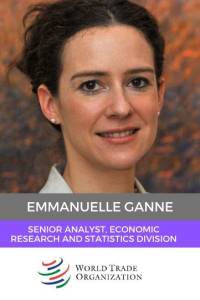
Is now an exciting time to be in trade finance? Why?
We’re living through very exciting times in trade finance. Digitalization of the trade finance industry holds high promises not only for financial institutions, but also for small and medium-sized enterprises, which are too often locked out of the trade finance market because of cumbersome procedures and requirements and high costs. Distributed ledger technology (DLT), in particular, could have a transformational impact on the trade finance market. Numerous DLT platforms have emerged in the trade and trade finance space over the last two years.
Long confined to proof-of-concepts, these projects are increasingly moving to the production stage. This is good news, but the technology in itself will not be sufficient to truly transform the trade finance industry and remove frictions from international trade. One of the challenges we’re facing is to make these different platforms talk to each other. Promoting cross-industry standards will be critical and should be our priority.
Another exciting field of work is sustainable trade finance. Achieving the United Nations’ Sustainable Development Goals (SDGs) will require a shift in mindset, away from short-term investment gains to long-term sustainability imperatives. It will require integrating environmental, social and/or governance considerations with a view to driving sustainable behaviours and supporting sustainable global value chains.
Do you find that there is a gender gap at the top in trade?
No doubt there’s a gender gap in senior positions in trade. I don’t count the number of time I ended up being the only woman in the meeting room or one of the few. However, things are changing, and we now see more women holding top positions in trade. This is good news, but there is still some way to go before we achieve parity. We also see more women being invited to speak at conferences. For the first time last year, I sat on an all woman panel. It did not go unnoticed. Kudos to the organizers!
How do we attract more women into careers within the trade/trade finance industry, that has traditionally been dominated by men?
The best way to attract more women into careers within the trade/trade finance industry is to give them an opportunity to shine and to grow to top positions! To give them an opportunity to become role models for the younger generation. Young women need to feel that there are opportunities for them. They need to see that other women have succeeded.
On International Women’s Day, what is the most important message you want to send out to young women thinking about their careers?
The most important message I’d like to give to young women thinking about their careers is to be driven by your values and to dare! Women, more than men, shine when their actions are aligned with their heart and their values. However, being driven by your values is not enough in today’s world. Networking is critical and men are often better at this than women. I’ve also seen too many women shying away from senior positions because they thought that others were more qualified than them. Many women don’t dare to apply to a position if they don’t tick all the boxes and women often underestimate themselves. Dare! Dare to reach out to people and network! Dare to apply to positions that interest you!
Reality Check – Blockchain & DLT for Global Trade, An Interview with Deepesh Patel and Emmanuelle Ganne
Merisa Lee Gimpel, Lloyds Banking Group

What specific tasks and responsibilities does your job require? What things do you like most about your job?
I joined Lloyds Bank just over a year ago to design the strategy and roadmap for Trade innovation and customer journey. I’m building a fantastic team and a pipeline of customer-centric innovation and transformation projects. My team and I are constantly running behavioural experiments and validating (and invalidating) innovation concepts. Not a workday goes by when I am not listening to or thinking about our customers: their moments of joy, their biggest challenges, the risks and opportunities they are facing, as they trade internationally.
We speak with many fintechs to understand if their solutions can solve our customers’ biggest pain points. The best part of my job is engaging with our customers and colleagues – the humans of trade finance – in creative ways, to design thoughtful solutions that improve their day to day lives. No two days are the same. I am surrounded by constant change, and I find that exhilarating.
Is now an exciting time to be in trade finance? Why?
Yes, more than ever. We finally have the perfect setting where technology and human centred design can come together beautifully to drive innovation that is valuable to our customers. I see two key areas of innovation in trade finance, both exciting. First it’s what can we deliver in the near-term that can enhance our customers’ trade journeys – incremental enhancements (some may not even need any technology change) that make a difference to their day to day activities and won’t take years to launch. Secondly, what can ‘trusted network’ solutions can we – as banks, corporates, logistics providers and other key players in the trade ecosystem – collaboratively design that can digitise the trade finance landscape across multiple players? The sweet spot for innovation – so that what we launch actually gets adopted – is when solutions are feasible (with the right technology and operating model), viable (makes sustainable business sense) and most importantly, desirable (something your customer really needs).
What’s the most important piece of advice you’d give to a woman thinking of starting a career in trade finance?
My advice comes in three parts. Firstly, be confident in your ability and the skillset you bring to the table. Don’t be daunted by experts in this field or worry you don’t fit in with the status quo (or your view of what the ‘typical trade finance banker’ is). Don’t think you’ll need years of training before you’re able to make a difference. Secondly, surround yourself with positive people and stay healthy and resilient. A positive work environment is so important. When you wake up, are you well-rested and filled with a sense of purpose and excitement to start the day? And finally, think big: be ambitious with the goals and vision you set for yourself and don’t be restricted by the current definition of trade finance: five or ten years from now, this space will be very different from what it is today – and you can be a part of this exciting evolution.
How do fintechs work with banks, and how can we rethink the customer journey for trade finance? TFG spoke to industry experts, in partnership with Finastra.
Olena Gryniuk, SME Banking Club

What does the International Women’s Day slogan, #EachforEqual mean for you in your work life?
Every year PwC is doing research called Women in Work Index, covering 33 OECD countries. The situation is improving but women still face inequality. According to the latest Women in Work Index 2019, the average gender pay gap is 15%. Iceland and Sweden are ranked with 1st and 2d place respectively and have the best Female boardroom representation index (38% and 43% respectively) and the Wage gap index 15,4% in Iceland and 12,8% in Sweden.
The best results from the Central & Eastern Europe region come from Slovenia (having 4th place) with a Gender wage gap 8,3% and Female boardroom representation 28%, and Poland (having 8th place) with Gender wage gap 5% and Female boardroom representation 11%.
According to PwC’s calculations, increasing the female employment rate could increase GDP even by 30%. (You can find full report here).
So, it’s time to celebrate women at International Women’s Day with equal opportunities, payment, and motivation for entrepreneurship!
Banks are doing a great job in this area by creating women entrepreneurship programs. From the latest examples – this year Santander UK launched a campaign to inspire and support female entrepreneurs.
And there is another very good example that I recall very often in my mind. Two years ago, during our SME Banking Club Conference in Tbilisi (Georgia), I talked to one of the speakers – Maya Margie Younes from BLC Bank (Lebanon) – on what does it cost to be a female entrepreneur in Lebanon and which support banks can give in that area. So, except cultural stereotypes (women are expected by their husbands to be fully devoted to their families), women in Lebanon face considerable challenges in access to finance. Because they have less tangible assets such as property or guarantors to secure their loans and end up with fewer opportunities than men, in some religions, a woman will receive a smaller inheritance than her brother will as she is expected to marry a man who will eventually inherit from his father. So, women end up with less to offer as collateral than men and are faced with a much more significant challenge when it comes to accessing finance and starting their own business. And BLC Bank collaborated with IFC on special programs for female entrepreneurs by letting them take loans from the Bank with minimal or almost no collateral. As for me, this is a very feasible support! (Full interview is available here.)
On International Women’s Day, what is the most important message you want to send out to young women thinking about their careers?
Girls, be brave! Do what inspires you! Do it today, right now! Think big! And demand equality! Because if you don’t, you will never have it.
TFG spoke to Olena Gryniuk at SME Banking Club to explore these in relation to CEE.
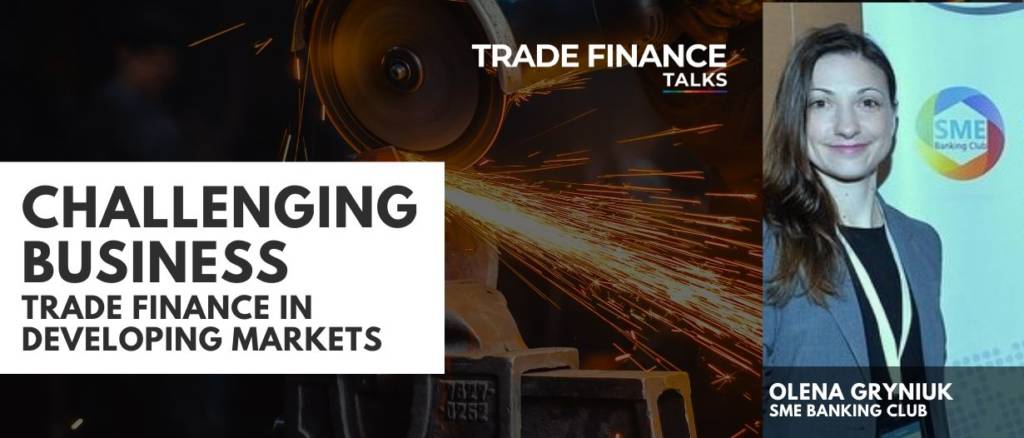
Anabel González, Peterson Institute
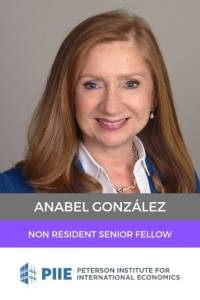
Why did you choose a career in this sector?
Trade is a powerful instrument to promote growth, foster economic transformation and open opportunities, and I have always felt strongly about working with a purpose and having impact. Over the years, I have had the privilege of contributing to my own country’s trade integration with the world, fostering economic diversification, creating new jobs and fueling growth. I have also seen first-hand the benefits of trade across the world in places as diverse as Ethiopia, Vietnam, Peru or India, including how trade can help empower women via access to new jobs.
Trade is also about connecting people and countries, and learning about others and I like this. Be it in government or the private sector, international organizations or academia, it is very exciting to work in the trade field.
On International Women’s Day, what is the most important message you want to send out to young women thinking about their careers?
Think about what you like, learn as much as you can, work hard and do not be afraid. Good work will take you from one place to another. Ask for help and help others. Build resilience. Cherish the opportunity.
We spoke to Anabel Gonzalez during the World Trade Symposium in New York. We discussed whether the current US-China trade war had a positive impact on Latin American trade flows. Geopolitical uncertainty continues to threaten foreign investment and economic growth, particularly in emerging markets. Policymakers around the world are fretting about trade uncertainty and its impact on access to business finance, meanwhile, innovation and competition remain critical for economic growth.
Beata Javorcik, European Bank of Reconstruction and Development
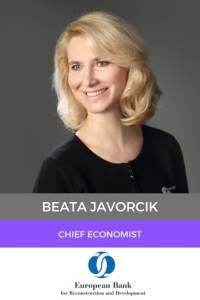
Why did you choose a career in this sector?
I grew up in Poland when it was still a socialist centrally-planned economy. As a teenager, I wanted to become an international trade specialist, which at that time meant working for the trade ministry and flying around the world to sign import and export contracts.
The socialist system collapsed, central planning went away, but my interest in international trade remained. So I became an academic economist specializing in international trade, with trade finance being one of my research interests.
Is now an exciting time to be in trade finance? Why?
The past few years have seen a lot of trade-related uncertainty caused by Brexit, trade wars and the current supply chain disruption caused by the corona virus outbreak. Looking ahead, the possibility of border carbon taxes, and particularly the lack of detail on how exactly they could be implemented, can fuel further uncertainty. And in uncertain times trade finance matters more than ever, so it is an exciting time to join the industry.
On International Women’s Day, what is the most important message you want to send out to young women thinking about their careers?
When I started my first job, I believed that good work would be noticed, so there was no need to ask for recognition. Not to mention that asking for things directly seems like an impolite thing to do. And then one day the assistant of my boss said to me: ‘Beata, you get in there and ask for a promotion. All of your male colleagues are doing it.’ And she was absolutely right. My advice to young women is: don’t be afraid to ask for things, just do it in a nice way and realize that sometimes the answer will be ‘no’, but this should not discourage you.
The title of the EBRD’s transition report 2019-2020 – “Better Governance, Better Economies” – summarises its message well. Good governance matters. It matters at the level of countries, subnational regions and firms…
Cecile André Leruste, Accenture
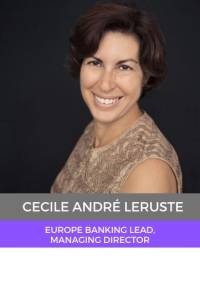
Why did you choose a career in this sector?
I chose a career in the banking sector as this industry is a major engine of the Global economy; during my career, I have had to overcome a number of challenges relating to my being a woman. In all cases those challenges were cultural, be them in Japan, Korea or France and the UK ; I rapidly became one of the few women with a P&L in Corporate banking, while my female ex-colleagues would shift to support/control functions.
On International Women’s Day, what is the most important message you want to send out to young women thinking about their careers?
In order to overcome those challenge more broadly, I have launched the “Circle of leading women” in France, which gathers most women in Large Corporates with P&L responsibilities to help their promotion to the Executive Committee. We focus on Personal Positioning, Networking, and support them play the right Cards in their careers. Over the last 5 years, 40% of our members have been promoted to the Executive committee.
I am glad to see a growing number of talented women heading Trade and Transaction banking and I would like to share three “Tarot-like cards” that have been played with success by the Circle members and three cards to avoid: Play the Queen, the Artist, the Animal cards, and avoid the Cinderella, the Daughter and the imposture syndrome cards.
Trade and supply chain finance is at the forefront of innovation as there are currently many pain points for corporate clients and banks. As the industry moves towards a platform model, we heard from Accenture’s Cecile Leruste on thee major transition and megatrends going on in commodity finance.
Maria Mogilnaya, European Bank of Reconstruction and Development
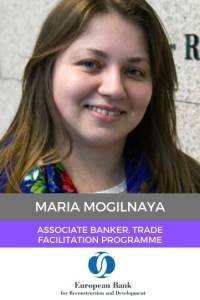
Why did you choose a career in this sector?
Even though I graduated from a school which had a focus on mathematics; geography was my favourite subject and I was the only pupil in school (in my graduation year) to pick geography for one of my final exams. I was always particularly fascinated by economic geography, as we learned what grows where, which country manufactures what and how these goods travel around the world (over which seas, rivers and canals). I believe this is also the reason for my wanderlust. When I started my career at the EBRD, my curiosity about the world of trade has only been piqued further. So as Douglas Adams put it: “I may not have gone where I intended to go, but I think I have ended up where I needed to be.”
What specific tasks and responsibilities does your job require? What things do you like most about your job?
In my work at the EBRD’s Trade Facilitation Programme, I am a “jack of all trades”: I structure trade finance transactions by arranging cover for the political and commercial payment risk; communicate with and visit banks in the EBRD’s regions on a daily basis to support development of their trade finance business; lead the EBRD’s work in the area of green trade finance; negotiate legal documents; and explore innovations in trade finance. What I love about my job is that I can help where others cannot (additionality is one of the EBRD’s core operating principles) and that I still learn at least one new thing every day!
Is now an exciting time to be in trade finance? Why?
Trade finance is undergoing many changes right now – sustainability and digitalisation are very high on every bank’s agenda. I am fortunate to be involved in both areas. I lead the EBRD’s work in the area of green trade finance and represent the EBRD in the working group on sustainable trade finance within the ICC Banking Commission. These are exciting times as we work on defining what sustainable trade finance is! As for technological innovations in trade finance, so many projects are happening in this space! While distributed ledger technology, artificial intelligence and digitalisation are only buzzwords to some, for me they mean enormous opportunities for trade finance. And, as with all changes, we must embrace them (or at least try to!) and observe what they bring to trade finance in the next few years.
How do we attract more women into careers within the trade / trade finance industry, that has traditionally been dominated by men?
There are many women in trade finance, especially among the junior and mid-career professionals. Women do enter the trade and trade finance profession but they do not seem to reach the top, which is traditionally dominated by men. The question is whether one is aiming for equality of opportunity or equality of outcome. I am a strong believer in equal opportunities – I think the opportunities are there, and there will be even more as trade finance evolves and becomes more digitised and sustainable. In my opinion, it is the most curious and knowledgeable who will rise to the top.
Maria spoke with TFG at the WTO Public forum, on the role of multilateral development banks in expanding trade in environmental goods and services.
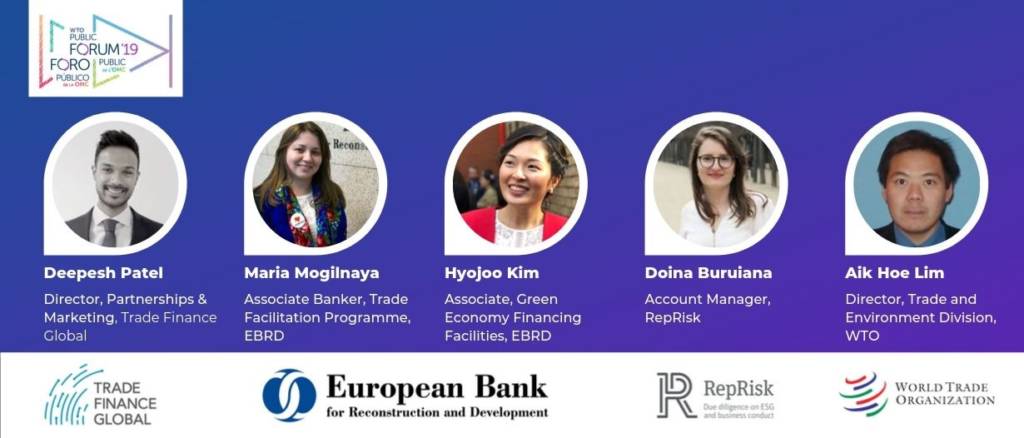
Gwen Mwaba, Afreximbank
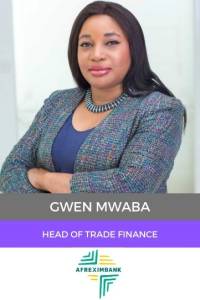
What specific tasks and responsibilities does your job require? What things do you like most about your job?
My day to day job involves providing loans and other debt facilities to clients. I have to identify risks and mitigate those risks in order to ensure that the Bank gets repaid. The different types of risk include financial risk, commodity price risk, competitor risk, political risk, foreign exchange risk and repayment risk etc.
In addition to the transactional side of my job, I also lead and manage a team and ensure that they deliver to a high standard whilst remaining motivated. I’m also responsible for executing the strategy of the Bank and delivering results in line with the budget.
The one thing that I like most about my job, is making my clients happy by delivering on their requirements because the outcome of what I do results in job creation or job preservation and for every job saved or created, there’s a family benefitting. This makes my job very fulfilling.
In your opinion, why is it important that more women take up trade as a career in the near future?
I think skilled trade professionals are a scarce resource generally and more so when it comes to women. Trade is the engine of any economy, so it’s important that more women look to banking and in particular trade financing as there are many fulfilling career opportunities in this particular stream of banking. Trade financing can be a quite fast paced environment and women thrive due to their innate ability to multitask. Trade financing can play a key role in empowering women economically and since women understand the challenges that women in general face, women in trade can also be a driving force when it comes to advocating for and supporting women owned businesses.
Is now an exciting time to be in trade finance? Why?
I believe now is a very exciting time to be in trade finance because the world of trade is also changing and evolving along with the changes occurring globally in other areas. Digitisation of trade is a topical issue that seeks to make trade more efficient and cost effective. In addition, the focus on alternative means of financing trade such as Supply Chain Finance or financing through Fintechs, the use of blockchain in trade finance etc. All these are exciting developments that will contribute to the wave of change in the area of trade finance. Being a part of this evolution of trade is certainly very exciting. In addition, trade continues to face a static trade financing gap, so it is probable that these innovations and alternative means of financing trade, may be the solution to bridging the ever persisting trade financing gap that exists globally.
For Africa, the trade finance gap has been estimated at USD 110-120 billion. TFG spoke to Afreximbank on the challenges/ opps that lie ahead.
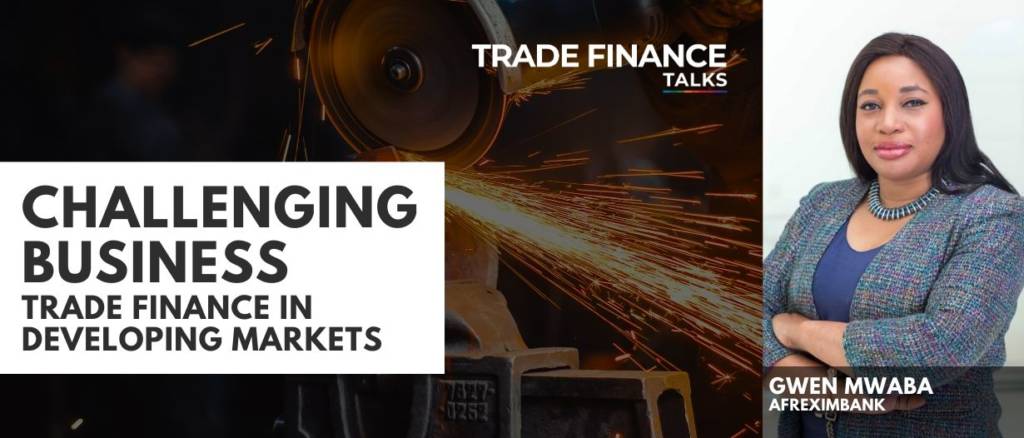
Liliana Fratini Passi, CBI
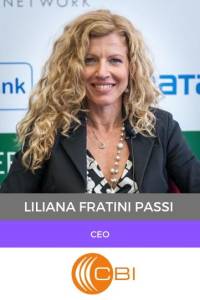
Why did you choose a career in this sector?
In my life there have been a few events that led me to work in the banking and financial fields. I would quote Steve Jobs who said, “You can’t connect the dots looking forward; you can only connect them looking backwards”. After graduating in Economics in Rome, I completed a Masters in Economics and Management of Financial and Insurance intermediaries at the LUISS Business School in Rome.
In 1996 I stepped in the Italian Banking Association – Finance Sector – to contribute to the so-called “Euro Project” aiming at the creation of the Single European monetary Union, which came to light in 1999 with the EURO coin.
Afterwards, completed this very relevant institutional experience, I took my first challenge joining a Telecom operator start-up, Finance Sector. At that period, from the high-level perspective of institutional project, I learned what was a telco company, how important were infrastructures, technology in the customer experiences in their financial process. I learned so many operational aspects all of that very important to become a bold manager.
In 2001, I took the challenge to come back to ABI to take care of the start-up of the Association for Interbank Corporate Banking (ACBI), aiming at defining the governance of the most important Italian cash management service used today by more than 3 million of Italian corporates. Since that time, much water flew under the bridge.
As of today, in my position of CEO of CBI, the industry utility supporting the Italian financial system, I have been always following innovative projects facilitating the relationship between companies-citizens-Public Administration and Payment Service Providers as well as the projects related to the relationship between incumbent and newcomers. The transactional services sector, which has played a key role in financial innovation in recent years, is certainly stimulating.
For example, under my responsibility with a strong commitment and a strategic vision CBI Globe – a collaborative open banking platform- has been launched, recognized as an international best practice and able to simplify the connection between banks and fintechs within the framework of PSD2. Furthermore, CBI Globe allows Payment Services Providers to develop value-added services and compete in the new international payment scenario.
What does the International Women’s Day slogan, #EachforEqual mean for you in your work life?
This slogan is part of the culture of CBI. As a CEO of the company I have stuck to it over the last years. I have been managing resources promoting inclusive and diverse working environment.
In CBI and outside the company, I’m seriously and personally Committed in taking occasion to promote gender equality by joining, and sometime organising, national and international conferences in support of this topic. Furthermore, in the wake of the Italian Golfo-Mosca Law – which requires public companies to balance gender equality in the recruitment of directors – I also have carried out few researches unveiling the impact of this emerging law in the financial sector. These results have been widely discussed on the occasion of a series of conferences.
Furthermore, in Italy I am member of the jury of the annual R.O.S.A. award (Results Obtained Without Aid), promoted by Canova club to encourage gender equality. The prize celebrates the virtue and is a concrete and tangible example to future generations as it shows that through commitment, earnestness, hard work, you can achieve any goal.
On International Women’s Day, what is the most important message you want to send out to young women thinking about their careers?
Be always curious and open to learn from new and various experiences.
The job barrier for women is not so much at the beginning, but it rises with the advancement of the career and in the period in which the professional path should reach its peak. In fact, between 30 and 40 years old, when the career for men reaches a peak, women too often find themselves forced to make choices between work and family.
Companies need coaching, mentoring and international contamination.
Cultural heritage still contributes to creating penalizing scenarios for tomorrow’s leaders: man is educated as the one who will have to support the family. The woman is not. On the contrary, it would be advisable to teach our daughters to be economically independent. Women must be less afraid of leaving their comfort zone and try to be autonomous, without fear of disappointing others.
Finally, I consider team working crucial to achieve good results. For this reason, it is essential to be surrounded with a trusted team who can help you mould your career.
The Italian Banking market continues to face headwinds and pressures around new payment service directives (PSDII), challenges from the regulator, and changing customer needs. TFG caught up with the CEO of regtech innovator CBI about their latest product CBI Globe, and how this is positioned to help Italian banks succeed and grow.
Charlotte Prior, GIB
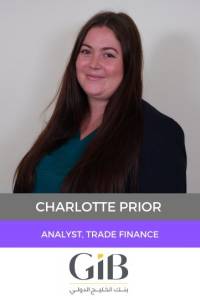
Why did you choose a career in this sector?
My career started when I left school and joined Bank of India as the receptionist. Although this role enabled me to learn about general banking, I had always wanted to work in a bank and being a receptionist wasn’t what I wanted to do in the long-term. After 8 months as the receptionist, I joined the Trade Finance team. I was extremely fortunate to have a great mentor who taught me everything I needed to know about Trade Finance Operations, and that’s how I knew I wanted to build a career in that industry. I loved that with Trade Finance, the daily tasks were never the same and that whilst going about daily operations, I was also learning about different commodities, such as cocoa and sugar.
5 years later, I am now a Trade Finance analyst as GIB Asset Management. I am fortunate enough to have another great mentor, my line manager who encourages me and empowers me on a daily basis. Although there is a shortage of women in the industry, there are also a huge number of men who empower, promote and encourage women on a daily basis in the fight to equality. Both the mentors I mention above are male!
Have you encountered any related challenges in your career along the way to becoming who you are today?
Even though I have been very lucky to have some great male mentors throughout my career, I have also faced some difficulties. In the past, I often felt that some male colleagues didn’t respect my opinion or even saw me as the “tea girl”. This has only made me stronger as I have learnt how to strengthen relationships with colleagues as well as how to articulate myself in a way that ensures I will be heard. Over the past 5 years, I have really noticed a change as more people push for equality in the workplace. There are so many great initiatives now to empower women, such as the SheCanBe initiative from the Lord Mayor’s appeal, which GIB Asset Management takes part in. Working for a company that has a female CEO and a high percentage of females in leadership roles has really inspired me to believe that I too can become a leader one day.
Is now an exciting time to be in trade finance? Why?
Absolutely! I think it is one of the most exciting times I have experienced in my career. ESG (or sustainability) has become a massive buzzword and is a hot topic. The discussion on climate change is heating up, not only in our industry but across the world and investors are starting to ask about how their funds are invested. This has, in turn, led to companies looking at their own ESG policies. Trade Finance has an undeniable role to play in the development of a more sustainable world. Through both direct and indirect lending, Trade Finance providers are able to build relationships on the ground in key commodity markets. Through these relationships, lenders are able to engage actively with borrowers, especially the SMEs in developing markets. Practitioners of Trade Finance can drive the implementation of ESG at the operating level, pushing the Trade Finance industry to become a significant contributor toward meeting the UN’s Sustainable Development Goals.
On International Women’s Day, what is the most important message you want to send out to young women thinking about their careers?
The message I would give to young women starting out in their careers is to be passionate and persistent. As we continue to fight for equality you are inevitably going to face pre-conceived conceptions about who can do what. Be persistent about your dreams and ambitions. If you continue to work hard you will be able to prove those people wrong. My other piece of advice would be to try and find a mentor, whether they are female or male. Mentorship is a great way to become the women you aspire to be!
TFG spoke to Charlotte Prior at Gulf International Bank about the implementation of Environmental Social and Governance (ESG), following on from the launch of GIB’s white paper: The incorporation of Environmental, Social and Governance (ESG) in the Trade Finance asset class.
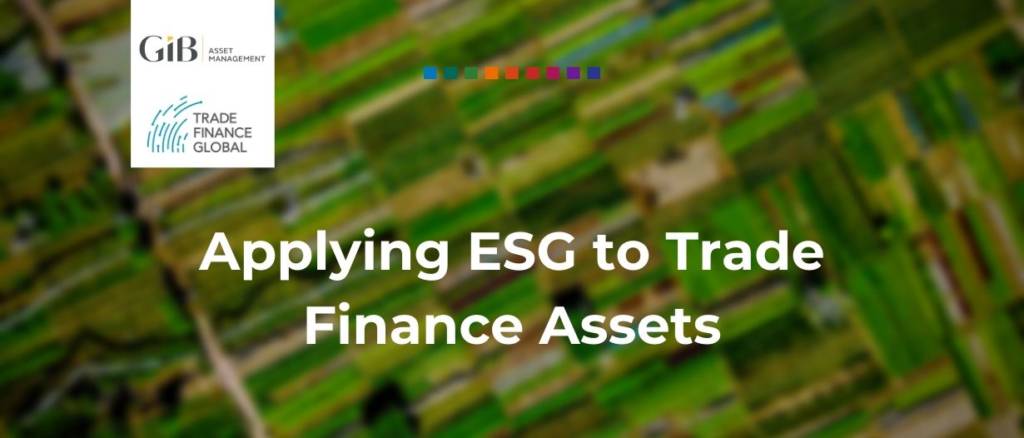
Louise Wiggett, Global trade Solutions
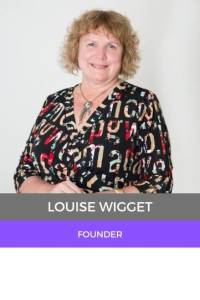
TFG spoke to Global Trade Solutions CEO on the potential for DLT to help alleviate issues around port congestion in the shipping industry.
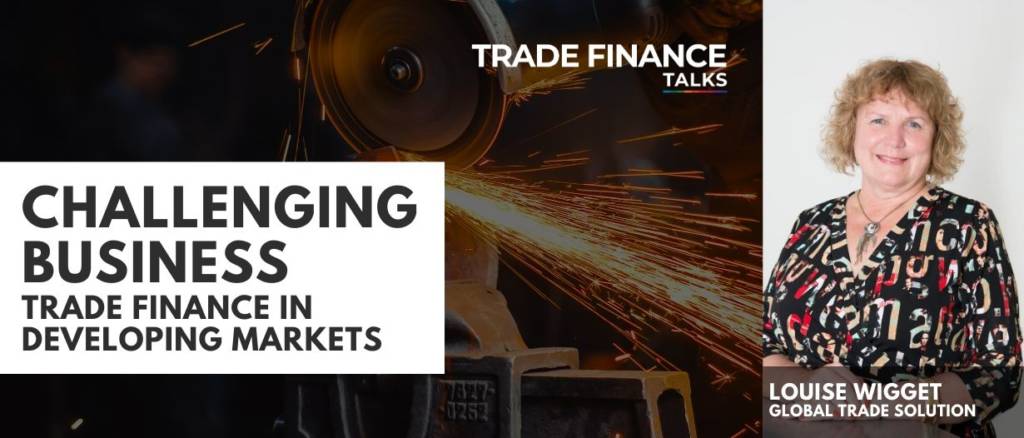
Sponsors & Partners
Learn MoreMore about Women in Trade
- WITTP Over The Years
- Topics
- Podcasts
- Videos















